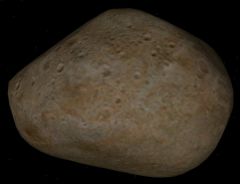Difference between revisions of "1869 Philoctetes"
Jump to navigation
Jump to search
(Corrected alternate designation.) |
m (Arvil moved page User:Arvil/Sandbox02 to 1869 Philoctetes: Move to article page.) |
(No difference)
| |
Latest revision as of 11:43, 28 October 2024
| 1869 Philoctetes | |
|---|---|

| |
| 1869 Philoctetes from Trojans.zip in Orbiter 2006P1 | |
| Designation | |
| Name | 1869 Philoctetes |
| Reference body | Sun |
| Planetary mean orbits | |
| Epoch | 2009.46064339 |
| Semimajor axis (a) | 778417560353.55 m |
| Eccentricity (e) | 0.0669389 |
| Inclination (i) | 3.96795000260644° (0.0692537921 radian) |
| Longitude of the ascending node (LAN, ☊) | 44.1067600007486° (0.7698081844 radian) |
| Longitude of periapsis (ϖ) | 8.3215899999407° (0.1452391445 radian) |
| Mean longitude (L) | 5.80464000040315° (0.1013100799 radian) |
| Selected physical parameters | |
| Mean radius | 25000 m |
| Mass | 8.4×1015 kg |
| Rotation elements | |
| SidRotPeriod | 24915.6 seconds (6.921 hours) |
| SidRotOffset | 0 |
| Obliqutiy | 0 |
| LAN | 0 |
| Note | *Elements given are from 1869 Philoctetes.cfg (Trojans.zip) |
1869 Philoctetes (4596 P-L) is Jupiter Trojan asteroid of the Greek camp (whose orbits lie in the L4 point 60° ahead of Jupiter. It was discovered by Cornelis Johannes van Houten and his team at the Palomar Observatory in February 1906 and was named after Philoctetes from Greek mythology.
1869 Philoctetes in Orbiter[edit]
1869 Philoctetes was introduced to orbiter with the release of Trojans.zip add-on in June 2009.
| Add-on | Source | Version | Author | Type | Release Date | Compatibility | Wiki article |
|---|---|---|---|---|---|---|---|
| Trojan Asteroids v1.01 | O-F Resources | v1.01 | sputnik | Scenery | 27 June 2009 | ||
See also[edit]
Gallery[edit]
| edit The Solar System | |
|---|---|
| Central star |
Sun (Sol) |
| Planets |
Mercury - Venus - Earth - Mars - Jupiter - Saturn - Uranus - Neptune |
| Natural satellites |
Moon - Phobos - Deimos - Io - Europa - Ganymede - Titan - more... |
| Add-ons |
Planets - Dwarf Planets - Small objects - Natural satellites - Alternative star systems |
